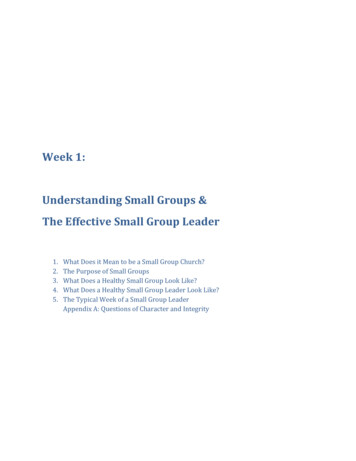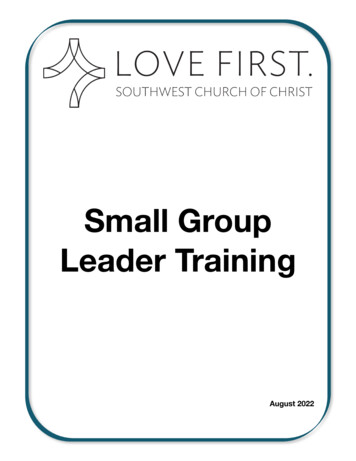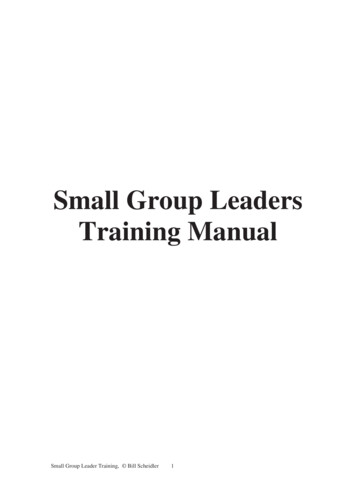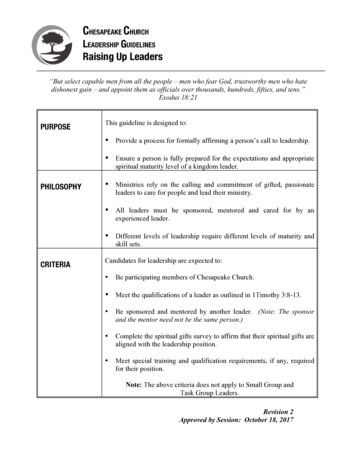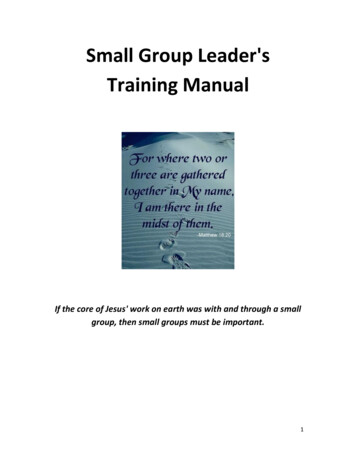
Transcription
Small Group Leader'sTraining ManualIf the core of Jesus' work on earth was with and through a smallgroup, then small groups must be important.1
Table of ContentsIntroduction to Small Groups4Two sides of the shepherding coin (caring and calling)9Facilitating living stones not watching stones24Book of Hebrews Small Groups31From Orphans to Family: Expressing the Welcome of God35Small Groups and Mission42Helping God’s people connect with Him among them472
Preface Acts 2:46-47 Day by day continuing with one mind in the temple, and breaking breadfrom house to house, they were taking their meals together with gladness and sincerityof heart, (47) praising God and having favor with all the people. And the Lord wasadding to their number day by day those who were being saved.God is a Divine Family. The Trinity was a Family before man was ever created. When Theycreated man in "Our own image and Our own likeness" (Gen 1:26-28), that image contained thedesign for family relationships. Ephesians 3:14-15 For this reason I bow my knees before the Father, (15) from whomevery (KJV the whole) family in heaven and on earth derives its name (identity).The creation mandate seen in Genesis 1:26-28, and 2:7-15 ("be fruitful, multiply, fill the earth,rule over and subdue it, take care of God's creation"), was about God creating and joining Hisfamily together in order to pursue His mission on the earth.The Bible begins with God's family walking together in pursuit of His mission and ends with Hisfamily fulfilling that mission at the great family event "the marriage supper of the Lamb" (Rev19:7-8). This idea of family on a mission is at the heart of God’s design for His church.Family is at the beginning, the end, and is woven throughout His plan. The story line of thewhole Bible can be summed up as God demonstrating His nature and redeeming activity in andthrough His family. Small groups are a part of walking in those family relationships as we pursueHis mission.In small groups people love God together, talk and pray through life issues together, eattogether, laugh together, and grow together as they engage in His mission. Small groups helpfacilitate living as God's family together on God's mission.To truly be connected to the House of God, not just a building or Sunday morning meeting, it isimportant to participate in both corporate gatherings as well as smaller groups.If Jesus needed to walk with a small group in order to engage in themission of God, then so do we!3
Introduction to Small GroupsBiblical precedent for ministry in the home (intimate settings)Much of Jesus activity centered around the home (intimate settings). Mark 1:29-35 After Jesus called Simon, Andrew, James, and John He entered Simon’shose and ministered there. People came to the home. See also Mt 8:14, Lk 4:38Matthew 9:9-12 After calling Matthew, Jesus went into his house for a meal with taxgathers and sinners. Notice the intimacy of the home with a meal.Matthew 10:1-15 Jesus sending out the disciples with authority instructs them to enterpeople’s houses. He speaks of getting personal with people entering their space. In Luke9:4 He sends out the 70 instructing them to enter houses. In Luke 10:1-7 they were notto move from house to house.Matthew 13:1-52 After teaching parables to the multitudes, Jesus took His disciples intoa house to further explain the parables in a more intimate bible study. We see the samething in Mark 7:17-23, 9:28, 10:10Matthew 17:24-27 Jesus takes Peter into the home setting to explain the concept ofpaying taxes. Again we see intimate instruction in the home setting.Matthew 26:1-13 Jesus is in the home of Simon the leper with His disciples when a ladyanointed Him with costly perfume as He was reclining at the table. See also Mk 14:3Mark 2:1-11 Jesus was in His home teaching a large crowd when the paralytic was letthrough the roof because of the large crowd.Mark 7:24-30 Jesus goes into a house to be with disciples when He encountered theSyrophoenician woman who insisted that Jesus help her. She said even the dogs underthe table feed on the crumbs.Mark 9:33-50 Jesus takes His disciples into a home and begins to teach them about Hisdeath.Luke 7:36-39 Jesus is in Pharisees home reclining at the table when the immoral womananointed and washed His feet with her tears and hair.Luke 8:41-56 Jesus enters Jairus house and ministers healing his daughter.Luke 10:38 Jesus in Mary and Martha’s house. Mary is the one that enters into closefellowship with the Lord which sheds some light on priorities in home meetings.Luke 14:1-24 Jesus in one of the leaders of the Pharisees home healing the man withdropsy. He goes on to teach the parable of the dinner guest.Much of the activity of the early church centered around the home (intimatesettings). Acts 2:2 The disciples were gathered in a house when they were filled with the Spirit.4
Acts 2:46 The early church met daily from house to house and in the temple. There wereinitially 3000 people. It would have been hard to get all of them into one meeting place.There were probable many home gatherings in that cityActs 5:42 After Peter and the apostles were released from jail they went to the templeand from house to house teaching and preaching about Jesus.Acts 8:3 Saul as he was persecuting the church went from house to house to dragbelievers off. Some of these were probably having meetings at the time of their arrest.Acts 9:11-19 God instructs Ananias to go find Paul in the house of Judas where he waspraying.Acts 10:1-8 Peter was staying at the house of Simon the tanner when He instructsCornelius the centurion to dispatch men to Peter that he would come to them. Peterwent to Caesarea into his house where the Gentiles heard the good news and were filledwith the Spirit.Acts 16:40 Paul enters the house of Syria where a group of the brethren were gatheringand he and Silas encouraged them.Acts 18:1-10 Paul went to Corinth and stayed with Priscilla and Aquila in their home. Heleft there and went to the house of Titius Justus whose house was next to the synagogue.He stayed in Corinth a year and six months.Acts 20:20 Paul in his farewell to the Ephesian elders reminds them of how he use tomeet with them publicly and from house to house teaching them. He was at Ephesusthree years.Acts 21:8 When Paul passed through Caesarea he entered the house of Philip theevangelist and stayed with them. HospitalityActs 21:30 While in Rome Paul was in rented quarters welcoming all who came to himpreaching and teaching them. HospitalityRomans 16:5 Paul instructs Romans to greet Prisca and Aquila and the church thatmeets in their house.Col 4:15 Paul refers to the church that is in the house of Nympha.Philemon 2 Paul refers to Apphia and Archippus and the church that meets in theirhouse.2 John 10 False teachers are no to be received into their houses (this could havereference to gatherings in their houses).House meetings in history.History indicates that Christians didn’t build church buildings until about A.D. 150-200, althoughthere are recent archeological discoveries that there were designated structure in caves nearRome as early as the 60-80sIf you would have ask “where is the church?” in any city of the ancient would where Christianityhad penetrated in the first century, you would have been directed to a group of worshippingpeople basically gathering in a home or other available facilities. The church is people.In the early days of the great Wesleyan Revival in England two hundred years ago, John Wesleydiscovered the importance of the small group for his day. He instituted small cell groups, classmeetings, for the conservation and development of converts. In response to a criticism of this5
method he wrote.”Many now happily experienced that Christian fellowship which they had notso much as an idea before. They began to ‘bear one another’s burdens’ and naturally to care foreach other.’ As intimate acquaintance with, so they had a more endeared affection for, eachother.” If you trace the history of revivals, you will find that many had their beginnings in whatwe call cottage prayer meetings, or cell groups.Purposes of Small Group meetingsQuotes: John Havlik “The church is never a place; but always a people, never a fold but always aflock; never a sacred building but always a believing assembly. The church is you who pray, notwhere you pray. A structure of brick or marble can no more be a church than your clothes ofserge or satin can be you. There is in this world nothing sacred but man, no sanctuary of manbut the soul.”Howard Snyder “In many western cities, the last thing the church needs is more buildings! Whatit often does need, however, is to rediscover true Christian community and fellowship."Mark 12:28-31 “What commandment is the foremost of all?" (29) Jesus answered, (30) ANDYOU SHALL LOVE THE LORD YOUR GOD WITH ALL YOUR HEART, AND WITH ALL YOUR SOUL, ANDWITH ALL YOUR MIND, AND WITH ALL YOUR STRENGTH.' (31) "The second is this, 'YOU SHALLLOVE YOUR NEIGHBOR AS YOURSELF.' There is no other commandment greater than these." To encourage and help every person develop a relationship with God.To encourage and help in developing relationships with His people.They help facilitate common family life together in Christ and by the Spirit. There is agreat importance of relationships in the Kingdom with God and one another. Church isnot a meeting but a way of life. It is people living out their relationships in Christtogether on a daily basis.Provide an environment for socializing and helping facilitate building relationships.Home meetings are only a facilitator. Just because you attend them is no guaranteethat you will go on and enter the relational life. We must avoid seeing theminstitutionally to the point that they are just another meeting we attend rather than alife we enter into. If we approach them correctly they will be a catalyst to build andenter into family relationships.They help provide a setting where God’s word is worked out in our lives.Often the main word to the body (mostly through Sunday morning messages) isamplified in the more intimate setting of small groups. As we evaluate the word in lightof our common everyday experience and how it is applied in those experiences theword gets worked into our lives. As we listen to other’s experiences of God’s wordworking in their life we gain greater perspective of how it is worked into our own life.They help create a relaxed natural atmosphere that helps foster every memberparticipating (every joint supplies Eph 4:16, Col 2:19). They participate throughencouragement and the exercise of spiritual gifts.They help develop people in worship, prayer, Spiritual gifting, teaching, andleadership on a more intimate less intimidating level.6
They help facilitate pastoral care of the sheep. They provided points of contact to seehow people are doing so we can see how to care for them.They can be helpful in administrating service in the church and serving one anotherThey are helpful for participating in God’s mission and working in the harvest (Mt 911, Lk 9-10). Jesus set forth this pattern while on earth as He was joined with a smallgroup as they engaged in God’s mission. He instructed His disciples to do the same inthe last supper dialogue, John 13-22. If Jesus needed a small group to engage in God’smission then we do to. Small groups can provide a less threatening atmosphere,whether we go to them in serving or they come around us, to engage unchurchedpeople so they get a taste of Kingdom life.6 important reasons for every member to participate in small groups.1. They are the laboratory for practicing unselfish love (God’s love) in a real way. In smallgroup connections you learn to care about others and share in their experiences, both good andbad. 1 Corinthians 12:26 And if one member suffers, all the members suffer with it; if onemember is honored, all the members rejoice with it. As we connect in a regular way wehave the opportunity to consider God and others and lay our lives down in real love asJesus commanded. 1 John 3:16 We know love by this, that He laid down His life for us; and we ought to laydown our lives for the brethren. Philippians 2:3-5 Do nothing from selfishness or empty conceit, but with humility ofmind regard one another as more important than yourselves; (4) do not merely look outfor your own personal interests, but also for the interests of others. (5) Have thisattitude(mind) in yourselves which was also in Christ Jesus,2. Small Groups give us “workouts” that help us grow and mature. Most people know thatexercise is good for their health, but doing it on a consistent basis is another matter. Just like amuscle never grows without exercise we will never mature spiritually without real spiritualexercise. Active participation is small group is like working out.The NT uses the phrase “one another” 59 times in such commands and "pray for, encourage,build up, love, and serve each other." These are the spiritual exercises that call us out ofselfishness and helps us grow. Few of them can be done in a weekly corporate meeting.We never grow in isolation. The only thing that tends to happen in isolation is self deception.We can fool ourselves into thinking we are more mature than we really are when we have noone else to consider than ourselves. Real maturity shows up in relationships.3. Small Groups help prove and confirm our identity as part of God’s family. We have anamazing potential in our humanity to be “legends in our own mind.” We can think certain thingsabout ourselves which there is little proof of in reality. Jesus said that we will truly be known asHis disciples if, and only if, we love one another.7
John 13:34-35 "A new commandment I give to you, that you love one another, even as Ihave loved you, that you also love one another. (35) "By this all men will know that youare My disciples, if you have love for one another." The active process of walking in lovehelps confirm we are His disciples.No one of us is Christ body on our own. As we walk together we participate in a real way as apart of Christ body and member of His family.4. Small Groups are the best way to participate in God’s mission to the world. Jesus firstdemonstrated this pattern as He walked on this earth in fulfilling His mission. He did so with asmall group. If Jesus needed to walk with a small group in order to fulfill His mission then weprobably do as well. When He sent the disciples, He did so two by two as fellow familymembers on mission (Mt 9-11, Lk 9-10).5. Small Groups connections help keep us from backsliding. Any of us are capable of deceptionand sin. There is as pattern in the Bible that our interaction with others helps keep us on track. Hebrews 3:12-13 Take care, brethren, that there not be in any one of you an evil,unbelieving heart that falls away from the living God. (13) But encourage one anotherday after day, as long as it is still called "Today," so that none of you will be hardened bythe deceitfulness of sin (Heb 10:20-25). James 5:19 My dear friends, if you know people who have wandered off from God'struth, don't write them off. Go after them. Get them backThere is also the Biblical pattern of Godly leadership that helps us in the process of staying ontrack with God. God gives all of us leaders to help “shepherd” us. They watch out for ourspiritual welfare and exercise the Biblical exhortations to guard, protect, defend, teach, and carefor our spiritual lives. Hebrews 13:17 Yield to those leading you, and be submissive, for theywatch for your souls, as those who must give account, that they may do it with joy and not withgrief; for that is unprofitable for you. (Acts 20:28–29; 1 Peter 5:1–4).6. Small Groups help provide a place for you to serve and develop your gifts. The Biblicalpattern for church is that “every joint supplies.” Ephesians 4:16 from whom the whole body,being fitted and held together by what every joint supplies, according to the proper working ofeach individual part, causes the growth of the body for the building up of itself in love (Col 2:1819). People draw strength from your perspective and experiences of life. You have unique giftsand abilities that play an important role in God’s family. Participating in Home Groups helpsgive a place for you to serve with your gifts and talents to build up His body. 1 Corinthians 12:7But to each one is given the manifestation of the Spirit for the common good .1Co 14:12 So alsoyou, since you are zealous of spiritual gifts, seek to abound for the edification of the church.8
Two Sides of the Shepherding Coin:Calling, and CaringWe are not a church that has small groups but a Spiritual family of smallgroups. Importance of Mt 18:19-20Our Identity of small groups is rooted in the Trinity (God's family)The initial creation account shows us that God created mankind in "OUR image and OURlikeness" Genesis 1:26-28 Then God said, "Let US make man in OUR image, after OURlikeness.(27) So God created man in his own image, in the image of God he created him; maleand female he created them. (28) And God blessed them. And God said to them, "Be fruitful andmultiply and fill the earth and subdue it, and have dominion over the fish of the sea and over thebirds of the heavens and over every living thing that moves on the earth."God's image is a relational family (Eph 3:14-15, Isa 9:6 etc.). In the Trinity there is a small group(even though They are the Godhead) walking in relational oneness as they carry out Theirmission.While on earth Jesus' primary base of operation and mission was with and through 12 peopleHe had joined together as a small group in family relationships (Mk 3:14-34).Jesus prayed His last prayer on earth asking 3 times that His church would walk in the sametype of relational life the Godhead has (with Them and each other). John 17:11-22. Holy Father, keep them in Your name, the name which You have givenMe, that they may be one even as We are. (15) "I do not ask You to take them out ofthe world, but to keep them from the evil one.(18) "As You sent Me into the world, Ialso have sent them into the world.(20) "I do not ask on behalf of these alone, but forthose also who believe in Me through their word; (21) that they may all be one; evenas You, Father, are in Me and I in You, that they also may be in Us, so that the worldmay believe that You sent Me. (22) "The glory which You have given Me I have given tothem, that they may be one, just as We are one; (23) I in them and You in Me, thatthey may be perfected in unity, so that the world may know that You sent Me, andloved them, even as You have loved Me.Paul expressed the same desire that Jesus prayed for (even for people he hadn't met) Colossians 2:1-2 BBE For it is my desire to give you news of the great fight I am makingfor you and for those at Laodicea, and for all who have not seen my face in the flesh; (2)9
So that their hearts may be comforted, and that being joined together in love, they maycome to the full wealth of the certain knowledge of the secret of God, even Christ,Ephesians 2:20-22 BBE Built on the foundation of the Apostles and prophets, ChristJesus himself being the chief keystone, (21) In whom all the building, rightly joinedtogether, comes to be a holy house of God in the Lord; (22) In whom you, with the rest,are united together as a living-place of God in the Spirit.Ephesians 4:1-6:8 I therefore, a prisoner for the Lord, urge you to walk in a mannerworthy of the calling to which you have been called, (2) with all humility andgentleness, with patience, bearing with one another in love, (3) eager to maintain theunity of the Spirit in the bond of peace. (5:21) submitting to one another out ofreverence for Christ. Independence is the sin of satan.The whole story of the Bible is about God's redeeming activity through His people whom Hehad joined together as His family. The story is contained in the phrase, "God's family of Spiritfilled disciples walking together (relationships) on God's mission." It begins in Gen 1:26-28 andends in Revelation 19:1-10 with the conclusion of His mission at the great family event, themarriage supper of the Lamb. The Old Testament is about God's family (Adam/Eve, Noah,Abraham/Sarah, Isaac, Jacob, and his 12 sons who became 12 tribes that became a nation). TheNT is a continuation of God's family in and through Jesus Christ (Mt 12:48-50, Mk 3:14-34, Mk10:29-30, Eph 2:19-22, 3:14-21 etc.)TWO SIDES OF A SHEPHERDING COIN (CARING AND CALLING)Our identity as "God's family walking together (relationships) on God's mission" hasthe 4 post-resurrection commissions guiding us Matthew 28:18-20 And Jesus came and said to them, "All authority in heaven and onearth has been given to me. (19) Go therefore and make disciples of all nations,baptizing them in the name of the Father and of the Son and of the Holy Spirit, (20)teaching them to observe all that I have commanded you. And behold, I am with youalways, to the end of the age."Mark 16:15-16 ."Go into all the world and proclaim the gospel to the whole creation.(16) Whoever believes and is baptized will be saved, but whoever does not believe willbe condemned.Luke 24:45-47. (47) and that repentance and forgiveness of sins should be proclaimedin his name to all nations, beginning from Jerusalem.John 21:15-17 When they had finished breakfast, Jesus said to Simon Peter, "Simon, sonof John, do you love me more than these?" He said to him, "Yes, Lord; you know that Ilove you." He said to him, "Feed my lambs." (16) He said to him a second time, "Simon,son of John, do you love me?" He said to him, "Yes, Lord; you know that I love you." Hesaid to him, "Tend my sheep." (17) He said to him the third time, "Simon, son of John,do you love me?" Peter was grieved because he said to him the third time, "Do you loveme?" and he said to him, "Lord, you know everything; you know that I love you." Jesussaid to him, "Feed my sheep."The 2 that are the most often neglected (The two sides of a shepherding coin)10
Caring: Shepherding and caring for His people (tending and feeding lambs andsheep (Jn 21:15-17)Calling: Making disciples and training people to put into practice everythingJesus commanded" (Mt 28:18-19)Caring without calling to discipleship produces spiritual hospitals or consumer churches thatpeople use rather than live in as a family on mission. Discipleship without caring produces thePharisees house. A good leader cares personally at the same time that calls and challengespersonally. When you challenge without caring its obnoxious aggression; when you carewithout challenging it’s ruinous empathy. When you do neither it’s insincere Christianity.CALLING: Making Disciples Who Put His Word into PracticeDiscipleship - The call to follow Him in order to be transformed (25 times in the Gospels Jesuscalls to "follow Me" only 4 times "believe in Me"). Jesus' clear emphasis was on following Him(Matthew 10:39, Mark 8:34-35, Luke 9:23-24, Luke 17:32-33, Matthew 16:24-25, Mar 10:21, Luk14:33, 18:22 etc.).Helping people grow and progress as disciples usually includes 5 things.1. Receiving God's word (teaching both conversationally as well other means) that applies toboth belief and living. The aim of discipleship is putting His word into practice.God’s freedom and blessing comes to authentic disciples following Jesus and obeying Hisword: Luke 11:27-28 While Jesus was speaking, a woman in the crowd shouted, "How blessedis the mother who gave birth to you and the breasts that nursed you." (28) Jesusreplied, "Rather, how blessed are those who hear and obey God's word." John 8:31-36 So Jesus was saying to those Jews who had believed Him, "If you continuein My word, then you are truly disciples of Mine; (32) and you will know the truth,and the truth will make you free.". 36 "So if the Son makes you free, you will be freeindeed. Matthew 28:19-20 "Go therefore and make disciples of all the nations, baptizing themin the name of the Father and the Son and the Holy Spirit, (20) teaching them toobserve all that I commanded you; and lo, I am with you always, even to the end of theage." Romans 1:5 through whom we have received grace and apostleship to bring about theobedience of faith among all the Gentiles for His name's sake, Hard to separate belief and obedience John 3:36 Whoever believes in the Son haseternal life; whoever does not obey the Son shall not see life, but the wrath of Godremains on him.11
Discipleship isn't information based but relationally following and obeying Jesus. James 1:21-25 Therefore, putting aside all filthiness and all that remains of wickedness,in humility receive the word implanted, which is able to save your souls. (22) But proveyourselves doers of the word, and not merely hearers who delude themselves. (23) Forif anyone is a hearer of the word and not a doer, he is like a man who looks at his naturalface in a mirror; (24) for once he has looked at himself and gone away, he hasimmediately forgotten what kind of person he was. (25) But one who looks intently atthe perfect law, the law of liberty, and abides by it, not having become a forgetful hearerbut an effectual doer, this man will be blessed in what he does.John 13:17 "If you know these things, you are blessed if you do them.Any time the word is shared we need to think of steps to put it into practice. This iswhat Mt 28 is about, not just information but obedience-based discipleship.3 John 1:4 I have no greater joy than this, to hear of my children walking in the truth.Three important things to consider when sharing any portion of God's word What do you want people to know?What do you want them to do in light of the knowledge?How can you both help them hear from Jesus and practically suggest steps to walk inthe word?Remember that we are always seeking to put it into practice His word that comes up in oursmall group gatherings through the gifts of the Spirit, worship, fellowship, testimonies, orlooking at the Bible. Here are questions we should always be considering in small groupgatherings regarding His word. What is Jesus speaking to you with this knowledge and how will you respond?What is a practical step that you can take to put this word into practice?What are you planning on doing with this knowledge? Articulate at least one step ofobedience you will put into practice this week.How will the hearing of this truth affect your life? This interrupts the consumersmindset that we have in the church world.How will what we heard affect us in loving God as well as loving and serving others(the 2 great commandments of Jesus)? The endpoint of discipleship is our livesreoriented around loving God and loving/serving others.What are some of the challenges to put Jesus' word into practice so we can encourageand pray for you?2. Personally encountering Jesus through private Spiritual disciplines (prayer, worship,and Word).3. Engaging in personal ministry (serving and mission).12
4. Encountering and walking in Godly relationships that put into practice the 59 oneanother's. Heb 10:24-25 NASB and let us consider how to stimulate one another to love and gooddeeds, 25 not forsaking our own assembling together, as is the habit of some, butencouraging one another; and all the more as you see the day drawing near. Heb 3:12-14 NASB Take care, brethren, that there not be in any one of you an evil,unbelieving heart that falls away from the living God. 13 But encourage one anotherday after day, as long as it is still called "Today," so that none of you will be hardened bythe deceitfulness of sin. 14 For we have become partakers of Christ, if we hold fast thebeginning of our assurance firm until the end,5. Walking through Defining Moments that shape our faith.Defining moments involve pain and disappointment, the death of a friend, family member,divorce, prolonged illness, job transfer, or betrayal of a friend. Adverse circumstances candamage an individual's faith or deepen it.CARING: Walking with and taking care of God's people.Moses and Jethro's advice - Multiple shepherds caring for God's people asthey walk together on His mission. Exodus 18:13-22 It came about the next day that Moses sat to judge the people, and thepeople stood about Moses from the morning until the evening. (14) Now when Moses'father-in-law saw all that he was doing for the people, he said, "What is this thing thatyou are doing for the people? Why do you alone sit as judge and all the people standabout you from morning until evening?" (15) Moses said to his father-in-law, "Becausethe people come to me to inquire of God. (16) "When they have a dispute, it comes tome, and I judge between a man and his neighbor and make known the statutes of Godand His laws." (17) Moses' father-in-law said to him, "The thing that you are doing isnot good. (18) "You will surely wear out, both yourself and these people who are withyou, for the task is too heavy for you; you cannot do it alone. (19) "Now listen to me: Iwill give you counsel, and God be with you. You be the people's representative beforeGod, and you bring the disputes to God, (20) then teach them the statutes and the laws,and make known to them the way in which they are to walk and the work they are to do.(21) "Furthermore, you shall select out of all the people able men who fear God, menof truth, those who hate dishonest gain; and you shall place these over them asleaders of thousands, of hundreds, of fifties and of tens. (22) "Let them judge thepeople at all times; and let it be that every major dispute they will bring to you, but everyminor dispute they themselves will judge. So it will be easier for you, and they will bearthe burden with you.Jesus' heart in working with people in harvest Matthew 9:36-38 Seeing the people, Hefelt compassion for them, because they were distressed and dispirited like sheep without13
a shepherd. (37) Then He *said to
Small Group Leader's Training Manual If the core of Jesus' work on earth was with and through a small group, then small groups must be important. 2 Table of Contents Introduction to Small Groups 4 Two sides of the shepherding coin (caring and calling) 9 Facilitating living stones not watching stones 24 .
